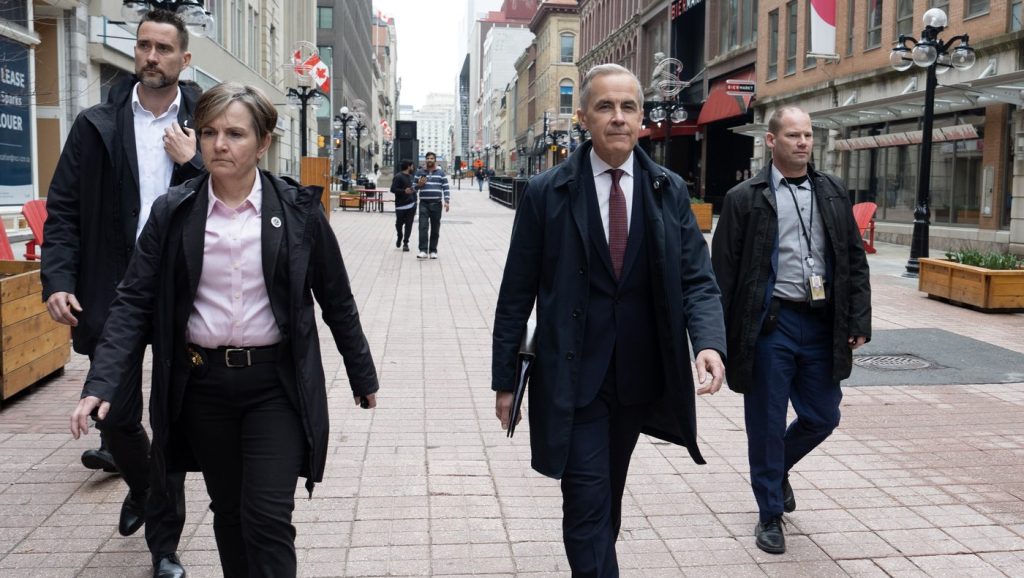Prime Minister Mark Carney is set to meet with U.S. President Donald Trump on Tuesday in Washington, a meeting that holds significant implications for Canada amidst rising tensions. Since Trump’s threats regarding the annexation of Canada, both Canadian citizens and businesses are watching closely, with the latter hoping for tariff relief. Carney's task is to navigate a delicate balancing act: he must display strength and resolve while ensuring Canada’s stability within the North American trade agreement, the Canada-U.S.-Mexico Agreement (CUSMA), which Trump’s tariffs have threatened to destabilize.
In his first news conference since taking office, Carney stated, “My government will fight to get the best deal for Canada.” CUSMA was initially negotiated during Trump's first term and was labeled by him as the “best deal ever,” with Canadian officials also hailing it as a win for Canada. However, as the agreement comes up for review next year, concerns have mounted over Trump’s intentions following his return to the White House. The president has previously indicated a willingness to disrupt the agreement, having already imposed tariffs on Canada and Mexico related to various issues, including the opioid crisis and trade in steel, aluminum, and automobiles.
Trump’s past provocations—such as belittling then-Prime Minister Justin Trudeau by labeling him a “governor” of Canada—have fueled concerns about Canada’s trade relationship with the United States. Nonetheless, there are signs indicating that Trump may still regard CUSMA as a significant accomplishment worth preserving. For instance, when the president broadened his trade war to include reciprocal tariffs in early April, Canada and Mexico were notably excluded from some tariffs, suggesting a strategic sidelining by the administration, potentially prioritizing CUSMA discussions.
The meeting on Tuesday is anticipated to provide insights into Trump's planned approach to what was once a robust and amicable bilateral relationship. Trump spoke positively about Carney last week, describing him as “a very nice gentleman” and expressing hope for a “great relationship” with Canada. U.S. Trade Representative Jamieson Greer has also hinted at a desire to maintain healthy partnerships with Canada and Mexico, emphasizing the need for increased manufacturing within North America.
However, key questions remain regarding what Trump seeks from Canada in upcoming negotiations. Greer outlined that a “good deal” would involve lowering tariff levels and addressing non-tariff barriers concerning U.S. agricultural products. He also mentioned the need to discuss digital trade, intellectual property, export controls, and commercial opportunities in critical minerals. CUSMA permits tariff-free trade for nearly all goods between Canada and the United States, and collaboration is already in place for critical mineral projects.
Steve Verheul, Canada’s former top trade negotiator, commented that the current climate echoes the earlier tensions of Trump’s first administration following the withdrawal from the North American Free Trade Agreement, which was subsequently replaced by CUSMA. He noted that despite the re-emergence of extreme proposals from the U.S., Canada has the potential to navigate these challenges as it did before by being inventive and proactively presenting solutions.
Verheul added that while Canada will face “a difficult negotiation,” he is optimistic about achieving continued duty-free trade. He underlined the importance of Canada presenting a unified front during talks with Trump, especially considering the recent Liberal minority win, which may complicate negotiations according to the president. Dawson, an expert on Canada-U.S. relations, advised Carney to cultivate a multi-party approach to trade, similar to the cross-party NAFTA advisory committee that included influential voices such as former Conservative leader Rona Ambrose.
As Carney prepares for the high-stakes meeting, he is tasked with being strategic. Businesses in Canada aim for economic expansion both domestically and in the U.S., but Dawson cautioned that Carney must tread carefully, as animosity towards the U.S. still exists among Canadians. The prime minister's ability to manage short-term crises in trade relations, alongside addressing the long-term competitiveness of Canada’s domestic economy, will be crucial.











